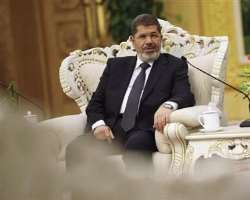PRESIDENT MORSI OUSTED: EGYPTIAN ARMY AS THE GUARDIAN OF DEMOCRACY

Was it not two years ago, when the so-called ‘Arab Spring’ revolution took place in Egypt? The long-time brutal and iron-fisted dictator Hosni Mubarak was dethroned and drove out of power. For the first time in the history of Egypt a democratic and free election was held and President Mohammed Morsi was elected by majority votes.
In the so-called revolution in Egypt that ushered in President Morsi, the army played a vital and somewhat constructive role in the ushering of democracy. When the people of Egypt rose up against Mubarak and his henchmen, the Egyptian army took the side of the people that swiftly made the difference and facilitated the removal of Mubarak from power.
Egyptian army has been known for its independence but with birth of democratic dispensation in Egypt the army was expected to succumb to the constitutional authority of presidency and accept the civilian control of the military. But that was not necessary the case, President Morsi has encountered a major problem in reining in the elongated power of the army.
Morsi could not be accused of not trying to tame the army’s adroitness and bravado. He made some changes in the army industrial complex by removing some top army brass and replaced them with those loyal to him. Yet the threat of the army to his ruler ship has never been subsided nor absolutely contained because the root of army domination could not be easily diminished by his limited surgical application. A more strategic planning and application with enhanced skill must be sufficiently applied to transform the army to a loyal institution in democratic arena. The inability to accomplish the task was part of Morsi’s failure and now he is paying for his mistake and incompetence.
The successful removal of the former President Mubarak with the aid of the army may have brought a temporary euphoria and a comfort level with populace. But it opened the door for the army to assume the role as guardian of democracy and this unassigned responsibility may be quite troubling. The army in democracy should not dabble into politics, and should be subject to the constitutional supremacy of civil authority. The function of the army is to defend the country from outside enemies and not to become the kingmaker. This is not how a healthy democracy is supposed to be run.
Most of the problems of President Morsi were self inflicted which was rooted in his paucity of political maturity. In democracy there are always political opponents and minorities, and without doubt that their views and rights must be jealously protected and respected.
But beyond Muslim Brotherhood party, many felted left out and detected the wall of intolerance erected. With pursuit and enhancement of non-secularism by Morsi administration, he invariably becomes more vulnerable because the public perceived his absconding of democratic principle for sectarianism.
Egypt’s army without a doubt was at a logger head with President Morsi, who fails to fully appreciate the threat of the army and the best possible way to neutralize the army’s ambition of being a credible alternative to Muslim Brotherhood Party. Morsi failed to do what was necessary to keep away the army from direct or indirect intervention in the country’s polity.
As a democratic elected politician, President Morsi failed to understand that his greatest power, strength and authority come from the people of Egypt who are the true guardian of the country’s democracy. Instead of working assiduously and diligently to unite the Egyptian people including his opponents and those that did not vote for him. Morsi rather pursued a one-dimensional grab of power, a miscalculation that rather strengthened the hands of the army. Unbeknownst to him, he succeeded in making the army more relevant, even as an alternative in political arena and landscape.
Written By Emeka Chiakwelu
